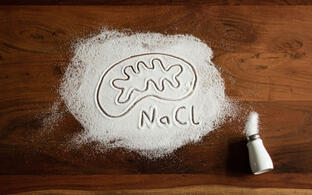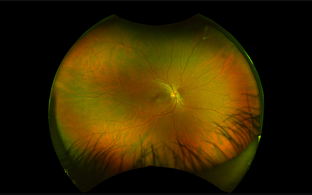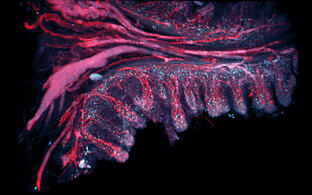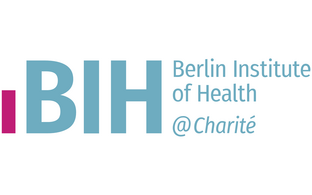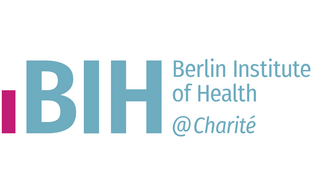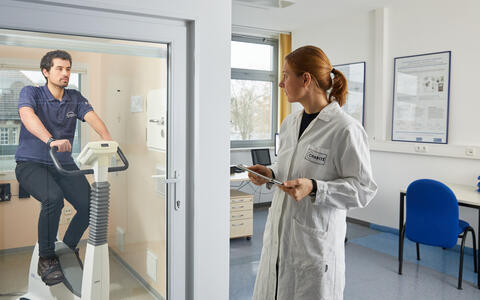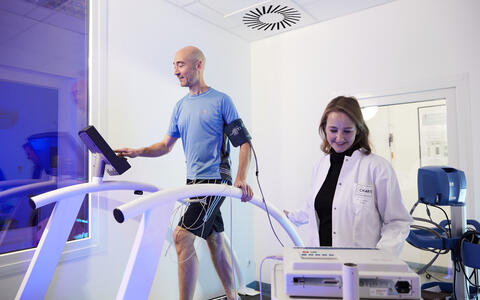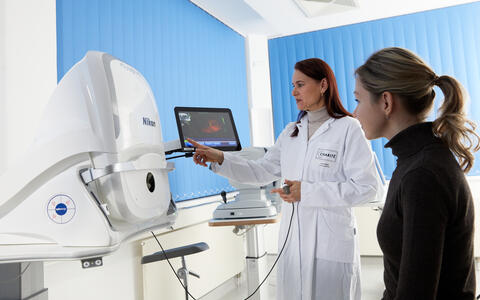- 2023
-
Mahler A, Schutte T, Steiniger J, Boschmann M. The Berlin-Buch respiration chamber for energy expenditure measurements. Eur J Appl Physiol. 2023. PMID 36849666.
Spranger L, Weiner J, Bredow J, et al. Thrifty energy phenotype predicts weight regain in postmenopausal women with overweight or obesity and is related to FGFR1 signaling. Clin Nutr. 2023. PMID 36863292.
Gerhalter T, Muller C, Maron E, et al. "suMus," a novel digital system for arm movement metrics and muscle energy expenditure. Front Physiol. 2023. PMID 36776973.
- 2022
-
Sperber PS, Brandt AU, Zimmermann HG, et al. Berlin Registry of Neuroimmunological entities (BERLimmun): protocol of a prospective observational study. BMC Neurol. 2022. PMID 36517734.
Jeran S, Steinbrecher A, Haas V, et al. Prediction of activity-related energy expenditure under free-living conditions using accelerometer-derived physical activity. Sci Rep. 2022. PMID 36195647.
Riveros-Rivera A, Penzel T, Gunga HC, et al. Hypoxia Differentially Affects Healthy Men and Women During a Daytime Nap With a Dose-Response Relationship: a Randomized, Cross-Over Pilot Study. Front Physiol. 2022. PMID 35685284.
Mahler A, Klamer S, Maifeld A, et al. Increased Salt Intake Decreases Diet-Induced Thermogenesis in Healthy Volunteers: A Randomized Placebo-Controlled Study. Nutrients. 2022. PMID 35057434.
- 2021
-
Bahr LS, Franz K, Mahler A. Assessing the (anti)-inflammatory potential of diets. Curr Opin Clin Nutr Metab Care. 2021. PMID 34155152.
Geisberger S, Bartolomaeus H, Neubert P, et al. Salt Transiently Inhibits Mitochondrial Energetics in Mononuclear Phagocytes. Circulation. 2021. PMID 33906377.
Bartolomaeus TUP, Birkner T, Bartolomaeus H, et al. Quantifying technical confounders in microbiome studies. Cardiovasc Res. 2021. PMID 32374853.
Maifeld A, Bartolomaeus H, Lober U, et al. Fasting alters the gut microbiome reducing blood pressure and body weight in metabolic syndrome patients. Nat Commun. 2021. PMID 33785752.
Kozarzewski L, Maurer L, Mahler A, Spranger J, Weygandt M. Computational approaches to predicting treatment response to obesity using neuroimaging. Rev Endocr Metab Disord. 2021. PMID 34951003.
Koppold-Liebscher DA, Klatte C, Demmrich S, et al. Effects of Daytime Dry Fasting on Hydration, Glucose Metabolism and Circadian Phase: A Prospective Exploratory Cohort Study in Baha'i Volunteers. Front Nutr. 2021. PMID 34395487.
Mahler A, Jahn C, Klug L, et al. Metabolic Response to Daytime Dry Fasting in Baha'i Volunteers-Results of a Preliminary Study. Nutrients. 2021. PMID 35011024.
- 2020
-
Mahler A, Wilck N, Rauch G, Dechend R, Muller DN. Effect of a probiotic on blood pressure in grade 1 hypertension (HYPRO): protocol of a randomized controlled study. Trials. 2020. PMID 33375942.
Boschmann M, Kaiser N, Klasen A, et al. Effects of dietary protein-load and alkaline supplementation on acid-base balance and glucose metabolism in healthy elderly. Eur J Clin Nutr. 2020. PMID 32873957.
Mai K, Klug L, Rakova N, et al. Hypoxia and exercise interactions on skeletal muscle insulin sensitivity in obese subjects with metabolic syndrome: results of a randomized controlled trial. Int J Obes (Lond). 2020. PMID 31819201.
Bahr LS, Bock M, Liebscher D, et al. Ketogenic diet and fasting diet as Nutritional Approaches in Multiple Sclerosis (NAMS): protocol of a randomized controlled study. Trials. 2020. PMID 31898518.
- 2019
-
Aktas MF, Mahler A, Hamm M, et al. Lifestyle interventions in Muslim patients with metabolic syndrome-a feasibility study. Eur J Clin Nutr. 2019. PMID 30538299.
- 2018
-
Klug L, Mahler A, Rakova N, et al. Normobaric hypoxic conditioning in men with metabolic syndrome. Physiol Rep. 2018. PMID 30565412.
Mahler A, Balogh A, Csizmadia I, et al. Metabolic, Mental and Immunological Effects of Normoxic and Hypoxic Training in Multiple Sclerosis Patients: A Pilot Study. Front Immunol. 2018. PMID 30555484.
Haas V, Stengel A, Mahler A, et al. Metabolic Barriers to Weight Gain in Patients With Anorexia Nervosa: A Young Adult Case Report. Front Psychiatry. 2018. PMID 29867616.
- 2017
-
Wilck N, Matus MG, Kearney SM, et al. Salt-responsive gut commensal modulates TH17 axis and disease. Nature. 2017. PMID 29143823.
Haufe S, Engeli S, Kaminski J, et al. Branched-chain amino acid catabolism rather than amino acids plasma concentrations is associated with diet-induced changes in insulin resistance in overweight to obese individuals. Nutr Metab Cardiovasc Dis. 2017. PMID 28958691.
Klaer J, Mahler A, Scherbakov N, et al. Longer-term impact of hemiparetic stroke on skeletal muscle metabolism-A pilot study. Int J Cardiol. 2017. PMID 28063669.
Adler C, Steinbrecher A, Jaeschke L, et al. Validity and reliability of total body volume and relative body fat mass from a 3-dimensional photonic body surface scanner. PLoS One. 2017. PMID 28672039.
- 2015 - 2010
-
Mossakowski AA, Pohlan J, Bremer D, et al. Tracking CNS and systemic sources of oxidative stress during the course of chronic neuroinflammation. Acta Neuropathol. 2015. PMID 26521072.
Haufe S, Kaminski J, Utz W, et al. Differential response of the natriuretic peptide system to weight loss and exercise in overweight or obese patients. J Hypertens. 2015. PMID 25882864.
Mahler A, Steiniger J, Bock M, et al. Metabolic response to epigallocatechin-3-gallate in relapsing-remitting multiple sclerosis: a randomized clinical trial. Am J Clin Nutr. 2015. PMID 25733633.
Mahler A, Steiniger J, Endres M, Paul F, Boschmann M, Doss S. Increased catabolic state in spinocerebellar ataxia type 1 patients. Cerebellum. 2014. PMID 24604678.
Haufe S, Haas V, Utz W, et al. Long-lasting improvements in liver fat and metabolism despite body weight regain after dietary weight loss. Diabetes Care. 2013. PMID 23963894.
Szabo T, Postrach E, Mahler A, et al. Increased catabolic activity in adipose tissue of patients with chronic heart failure. Eur J Heart Fail. 2013. PMID 23696611.
Pakula A, Schneider J, Janke J, et al. Altered expression of cyclin A 1 in muscle of patients with facioscapulohumeral muscle dystrophy (FSHD-1). PLoS One. 2013. PMID 24019929.
Mahler A, Mandel S, Lorenz M, et al. Epigallocatechin-3-gallate: a useful, effective and safe clinical approach for targeted prevention and individualised treatment of neurological diseases? EPMA J. 2013. PMID 23418936.
Mahler A, Steiniger J, Bock M, et al. Is metabolic flexibility altered in multiple sclerosis patients? PLoS One. 2012. PMID 22952735.
Haufe S, Utz W, Engeli S, et al. Left ventricular mass and function with reduced-fat or reduced-carbohydrate hypocaloric diets in overweight and obese subjects. Hypertension. 2012. PMID 22068866.
Haufe S, Engeli S, Kast P, et al. Randomized comparison of reduced fat and reduced carbohydrate hypocaloric diets on intrahepatic fat in overweight and obese human subjects. Hepatology. 2011. PMID 21400557.
Boschmann M, Engeli S, Moro C, et al. LMNA mutations, skeletal muscle lipid metabolism, and insulin resistance. J Clin Endocrinol Metab. 2010. PMID 20130076.


